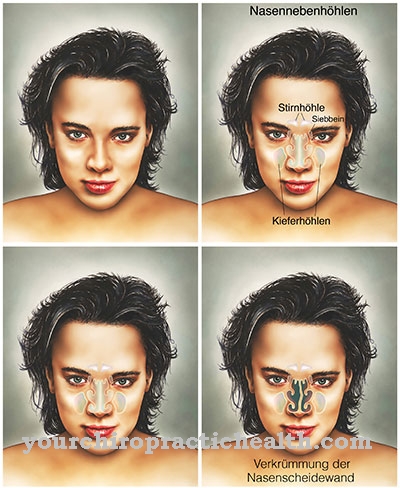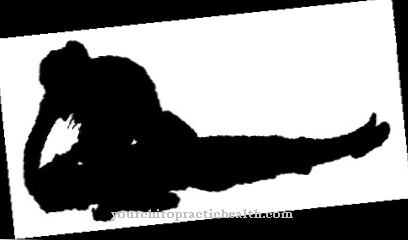A Gastric ulcer or. Gastric ulcer is an inflammatory disease of the stomach and in particular of the gastric mucosa. Stomach ulcers are among the most common stomach diseases in Germany. Elderly people are particularly affected. The main causes are increased gastric acid production and disturbed stomach movement and digestion.
What is a stomach ulcer?

© lom123 - stock.adobe.com
At a Gastric ulcer or. Gastric ulcer the mucous membranes in the stomach are inflamed. However, it is not a malignant ulcer, as it is e.g. in stomach cancer. In particular, the deeper layers of the stomach wall are damaged by inflammation.
A gastric ulcer mainly occurs in the area of the small internal curve in the stomach, which is also known as the small curvature in medicine. In addition to the gastric mucosal inflammation and the irritable stomach, a gastric ulcer is one of the most common diseases of the stomach. However, the disease usually occurs in old age, i.e. between about 50 and 70 years of age.
In most patients, stomach ulcers keep coming back, so that in these cases one can almost speak of a chronic inflammation of the stomach. The disease can be hereditary and is more likely to occur in the old age of the descendants of someone with gastric ulcer disease. The duodenal ulcer is a special form of this disease.
causes
The causes of a Gastric ulcer can be of various kinds. However, all causes have in common that the protective balance of the gastric mucous membrane in the stomach is disturbed. Above all, the gastric juices produced by the gastric mucosa are no longer produced to a normal extent. This then leads to digestive disorders within the stomach. In particular, it is the strongly corrosive stomach acids that can have an inflammatory effect on the gastric mucosa.
Roughly, internal and external causes of gastric ulcer can therefore be found.Internal causes include: increased production of gastric acid, disorders of the gastric function during the digestive process, impaired levels of certain proteins used to repair the gastric mucosa and the stomach wall, Zollinger-Ellison syndrome and overactive parathyroid glands with an overproduction of calcium, which promotes strong gastric acid.
External factors are mainly: Heavy alcohol consumption and smoking, the bacterium Helicobacter pylori, drugs that put a lot of stress on and attack the stomach, such as Cortisone and most often stress, psychological stress and hasty eating.
Symptoms, ailments & signs
A stomach ulcer can cause very different symptoms. Pain in the upper abdomen, which occurs mainly before or during food intake, is typical. In addition, there is nausea and vomiting, often associated with heartburn and diarrhea. Most patients are sensitive to certain foods that were previously well tolerated.
The gastrointestinal complaints often lead to weight loss and thus cause deficiency symptoms. In the course of the disease, gastric bleeding may occur. The affected area presses and hurts, whereby the pain increases when touched and can radiate to the sternum, lower abdomen and back. Many people suffer from the characteristic pain after eating.
For others, the symptoms occur on an empty stomach, with fasting pains usually occurring at night and being less intense. People with a stomach ulcer tend to notice changes in the color and consistency of the stool. The excretions can be black and slimy, but also watery and light in consistency.
A stomach ulcer is usually not visible externally. Only the changes in the stool and the sickly appearance that set in during the course of the disease indicate a serious condition. In severe cases, a slight external swelling may be noticed at the site of the gastric ulcer.
Course of disease
|
|
|
Becomes a Gastric ulcer not medically treated this can lead to life-threatening complications. Heavy bleeding in particular can lead to a rupture of the stomach wall. This circumstance must be avoided in good time. People who are more prone to stomach ulcers are particularly at risk.
The older the person is, the larger the ulcer, and the more often the patient has gastric ulcers, the greater the chance of further complications. Other complications can include: reduction in the size of the stomach wall, narrowing of the stomach and stomach cancer. The risk groups also include more men than women. Likewise, people with kidney weakness and liver cirrhosis are more likely to be at risk.
Although it is always advisable to seek medical help with this condition, the ulcers heal on their own in around 40 percent of those affected. Modern medicine increases the probability to over 90 percent.
Complications
A peptic ulcer can cause various complications. In around a third of all patients, the ulcer is only discovered through its sequelae. The most common effects of gastric ulcers include bleeding, which can be both acute and chronic.
It is not uncommon for the bleeding to cause vomiting like coffee grounds, bloody vomiting or the appearance of tarry stools. If ulcer bleeding occurs, it can even threaten the patient's life. Therefore, in this case, an emergency gastroscopy is required to stop the bleeding. The death rate from gastric bleeding is around ten percent.
Another dreaded complication of gastric ulcer is gastric perforation. About two to five percent of all sufferers suffer from this effect. Peptic ulcers caused by the use of non-steroidal anti-inflammatory drugs are particularly affected by perforation.
The reason for this is their often late diagnosis and treatment. The breakthrough of the stomach in turn carries the risk of inflammation of the peritoneum (peritonitis). Since this can reach life-threatening proportions, it must be treated rapidly by surgery. Ulcer penetration occurs in some patients.
This means that the ulcer is invading an adjacent organ. The covered perforation mainly affects the pancreas, which is due to its proximity to the stomach. Another complication is the narrowing of the stomach. It occurs due to scarring from recurring stomach ulcers.
When should you go to the doctor?
Pain and swelling in the stomach area should be examined and treated by a doctor. Before taking any pain reliever medication, it is advisable to consult a doctor so that there are no further complications. A doctor is needed in the event of nausea, vomiting, diarrhea or an intestinal obstruction. If there are changes in the complexion, a decrease in the performance level or a general malaise, a doctor should be consulted. Contact and pressure pain should be clarified by a doctor.
Feeling sick, looking pale, and weak inside are signs of an abnormality that should be treated. Heartburn, a decrease in body weight and deficiency symptoms are indications of an existing irregularity. A doctor's visit is required so that treatment can be initiated. Abnormal use of the toilet are further signs of illness.
Discoloration or peculiarities of the smell indicate an illness. If the consistency of the stool changes, flatulence occurs or mucous excretions occur, a doctor should be consulted. If stomach discomfort occurs even though it is on an empty stomach, this is considered unusual. Most of the time, the affected person wakes up from sleep due to the symptoms and thus suffers sleep disorders. A visit to the doctor is recommended if problems arise for several nights as a result.
Treatment & Therapy
First of all, a doctor should definitely be consulted if one is suspected Gastric ulcer consists. Depending on the diagnosed cause, individual treatment will then be initiated. In addition, all food and medication as well as smoking and alcohol consumption should be stopped immediately.
It is also advisable not to consume high-fat foods or coffee. Appropriate medication can be prescribed by your doctor to inhibit acid formation. The resultant reduced gastric acid production primarily spares the gastric mucous membranes of the stomach wall and alleviates painful complaints.
Typical medications prescribed for gastric ulcer include acid blockers, proton pump inhibitors (pantoprazole, omeprazole), histamine receptor blockers, and antacids.
For better stomach movement and better digestion, prokinetics can be used, which can provide relaxation, especially for severely cramped stomachs. If infected by bacteria, the antibiotics clarithromycin, metronidazole, or amoxicillin are also given.
If the gastric ulcer does not heal in spite of the therapy with the above drugs, an operation should be considered. In any case, gastric ulcer surgery is advisable if complications such as gastric rupture, gastric cancer, bleeding or gastric narrowing occur.
Outlook & forecast
If left untreated, a gastric ulcer can be expected to cause an increase in health impairments. In addition, there is an increased risk of secondary diseases. If a gastric ulcer develops into cancer, the chances of a cure are considerably reduced. If there is no medical care, the person concerned is at risk of premature death.
The prognosis is usually favorable when using treatment. Medicines are administered and the ulcer is removed. Although the surgical procedure is associated with risks, there is still a good chance of recovery. In the long term, the cause of the gastric ulcer should be determined and corrected.
In a state of emotional distress, a change in lifestyle is necessary. If the nutrition plan is not optimally designed, restructuring measures should also be initiated. Otherwise, the likelihood of a stomach ulcer developing again is greatly increased. If the illness occurs again, the prognosis is also favorable with rapid and rapid medical care.
Complications are to be expected in people with a weakened or not yet fully developed immune system. Therefore, their chances of recovery are reduced. A chronic course of the disease can develop, which is characterized by symptoms such as stomach pain, nausea, vomiting or irritation of the stomach.
prevention
The best protection from you Gastric ulcer is, as always, a healthy lifestyle. Above all, this includes sufficient exercise and sport in nature, a healthy and high-fiber diet, avoiding alcohol, smoking and too much coffee. You should also try to live a life free of stress and psychological strain as far as possible.
Aftercare
After the successful treatment of a gastric ulcer, sensitive follow-up care is essential to prevent the disease from recurring. The quality of life of those affected is significantly reduced by the disease, so they should move gently through everyday life even after recovery. Avoid excessive physical activity, as this could unnecessarily strain the sensitive abdominal area. Gentle food and a generally less stressful life are the best prerequisites for long-term health.
You can do that yourself
Once a stomach ulcer has been diagnosed, there are several things that people can do to relieve the symptoms and help them recover. The doctor will first recommend some dietary measures. Suitable foods can include whole grains, brown rice, steamed vegetables, fruits and potatoes. High-fat foods (e.g. fried foods, sweets and ready-made meals) as well as coffee and alcohol, on the other hand, should be avoided. Nicotine and other stimulants are also on the black list for a gastric ulcer and may only be taken in consultation with a doctor.
Sport and exercise in nature is also recommended for a gastric ulcer. A healthy lifestyle has a positive effect on a gastric ulcer and reliably prevents the development of further ulcers.
Before doing this, however, the cause of the disease should be determined and treated specifically. If the stomach ulcer is based on stress or another emotional illness, we recommend talking to a therapist. Changing jobs or moving to a new apartment often helps. The individual causes of the illness can often be determined with the help of a complaint diary and then addressed together with the doctor or psychologist.



.jpg)

.jpg)


.jpg)




















